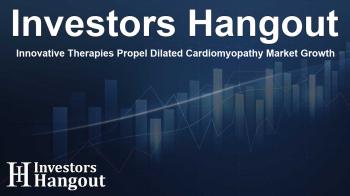Innovative Therapies Propel Dilated Cardiomyopathy Market Growth

Dilated Cardiomyopathy Market Surge
The dilated cardiomyopathy market is entering a dynamic phase of growth, fueled by a combination of factors such as a rising incidence of heart failure, robust advancements in diagnostic methods, and significant investments in genetic testing and therapies. As more patients seek proper care, enhanced research and development in gene therapies and novel drug candidates are paving the way for new treatment options.
Understanding Dilated Cardiomyopathy
Dilated cardiomyopathy (DCM) is a chronic heart condition that leads to the enlargement of the left ventricle, compromising the heart's ability to pump blood efficiently. This insufficiency can progress to heart failure if not properly managed. Patients may experience a spectrum of symptoms ranging from mild, such as fatigue and shortness of breath during exercise, to severe manifestations like persistent arrhythmias and significant swelling in the limbs.
While the precise cause of many DCM cases remains unknown, several external factors can contribute, including viral infections, alcohol misuse, chemotherapy side effects, autoimmune conditions, and nutritional deficiencies. Notably, up to half of all cases may have a genetic basis, emphasizing the importance of targeted research and personalized treatment approaches.
Epidemiological Insights
The epidemiology of dilated cardiomyopathy reveals a significant patient population, with an estimated prevalence of approximately 3 million cases across seven major markets. The U.S. accounts for nearly 45% of these instances. This highlights the need for increased public awareness, improved screening strategies, and timely diagnosis to manage the disease effectively.
Latest Market Developments
Investments in developing innovative therapies are expected to reshape the landscape of the dilated cardiomyopathy market. Leading pharmaceutical companies are working diligently on pioneering drugs that hold promise for enhancing patient outcomes. Some key therapies under development include Bristol-Myers Squibb's Danicamtiv (MYK-491), which aims to improve cardiac contractility, and Berlin Cures' BC007, targeting autoantibodies linked to heart function.
Additionally, Cumberland Pharmaceuticals has introduced DYSCORBAN (ifetroban), aimed at protecting cardiac function from fibrosis and inflammation, while Rocket Pharmaceuticals explores REM-001 as a groundbreaking treatment option. These therapies, along with several others in the pipeline, signify a transition towards more effective and personalized management of dilated cardiomyopathy.
Challenges in Treatment
Despite the advancements, treating dilated cardiomyopathy presents numerous challenges. The condition's heterogeneous nature complicates the development of uniform treatment protocols. Many patients experience delays in diagnosis due to the disease's nonspecific symptoms, which can mask its severity until it progresses significantly. Currently, there is no definitive cure, and existing treatments largely focus on symptom management and improving quality of life.
Common pharmacological interventions include diuretics, beta-blockers, and anticoagulants, which help manage symptoms and reduce the risk of complications. However, many patients still face poor long-term outcomes, necessitating ongoing research and investment in new therapies.
Future Outlook
The dilated cardiomyopathy market is positioned for significant growth in the upcoming years, bolstered by the introduction of novel therapies and an increase in diagnostics. Enhanced public awareness and genetic screening initiatives are expected to contribute to early detection and more effective disease management strategies. Yet, the market may encounter hurdles, such as the variability in treatment responses and the financial burden associated with long-term care strategies.
Frequently Asked Questions
What is dilated cardiomyopathy?
Dilated cardiomyopathy is a progressive condition characterized by the enlargement and weakening of the heart muscle, primarily affecting the left ventricle's ability to pump blood effectively.
How common is dilated cardiomyopathy?
It is estimated that around 3 million people across major markets are affected by dilated cardiomyopathy, with a significant portion of cases occurring in the United States.
What are the main treatment options available?
Currently, treatment focuses on managing symptoms and preventing complications, using medications such as diuretics, beta-blockers, and anticoagulants. Emerging therapies are also being developed for more targeted treatment.
What research is being done to advance these treatments?
Numerous pharmaceutical companies are investing in innovative drug development, including gene therapy and other novel compounds designed to improve heart function in patients with dilated cardiomyopathy.
What challenges does the market face?
Key challenges include the heterogeneous nature of the disease, difficulties in diagnosis, limited curative options, and the economic burden of ongoing treatment for patients.
About The Author
Contact Logan Wright privately here. Or send an email with ATTN: Logan Wright as the subject to contact@investorshangout.com.
About Investors Hangout
Investors Hangout is a leading online stock forum for financial discussion and learning, offering a wide range of free tools and resources. It draws in traders of all levels, who exchange market knowledge, investigate trading tactics, and keep an eye on industry developments in real time. Featuring financial articles, stock message boards, quotes, charts, company profiles, and live news updates. Through cooperative learning and a wealth of informational resources, it helps users from novices creating their first portfolios to experts honing their techniques. Join Investors Hangout today: https://investorshangout.com/
The content of this article is based on factual, publicly available information and does not represent legal, financial, or investment advice. Investors Hangout does not offer financial advice, and the author is not a licensed financial advisor. Consult a qualified advisor before making any financial or investment decisions based on this article. This article should not be considered advice to purchase, sell, or hold any securities or other investments. If any of the material provided here is inaccurate, please contact us for corrections.

